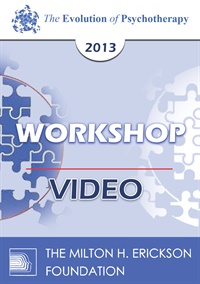- Average Rating:
- Not yet rated
- Topic Areas:
- Workshops | Motivation | Psychotherapy | Resistance | Therapeutic Relationship | Therapist Development | Cognitive Behavior Therapy (CBT)
- Categories:
- Evolution of Psychotherapy | Evolution of Psychotherapy 2013
- Faculty:
- Judith Beck, PhD
- Course Levels:
- Master Degree or Higher in Health-Related Field
- Duration:
- 3:04:03
- Format:
- Audio and Video
- Original Program Date:
- Dec 12, 2013
- Short Description:
- This interactive workshop presents a method for identifying, conceptualizing, and solving common problems in treatment. What do you do when patients present difficulties—for example, when they don’t do homework, get angry at the therapist, are afraid to reveal, go off on tangents, arrive late to session, demand special entitlements, engage in self-harm behaviors between sessions, jump from one crisis to another? Specialized techniques, adapted from psychodynamic, supportive, Gestalt, interpersonal, and other psychotherapeutic modalities, are often needed.
- Price:
-
Sale is $29.00
price reduced from Base Price - $59.00
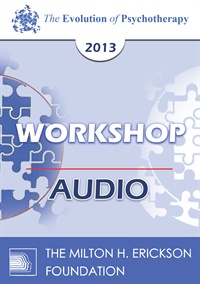
- Average Rating:
- Not yet rated
- Topic Areas:
- Hypnosis | Workshops | Phenomenology | Psychotherapy | Therapist Development
- Categories:
- Evolution of Psychotherapy | Evolution of Psychotherapy 2013
- Faculty:
- Jeffrey Zeig, PhD
- Duration:
- 2 Hours 14 Minutes
- Format:
- Audio Only
- Original Program Date:
- Dec 12, 2013
- Short Description:
- Understanding hypnosis as a composition of phenomenological elements facilitates induction. Basic methods will be described and demonstrated. Attendees will practice induction methods and learn indications for applying “hypnotherapy without trance” to empower clinical methods in any form of psychotherapy.
- Price:
- $15.00 - Base Price
- Average Rating:
- Not yet rated
- Topic Areas:
- Workshops | Feedback Informed Treatment (FIT) | Relationships | Tailoring | Therapeutic Relationship | Therapist Development
- Categories:
- Evolution of Psychotherapy | Evolution of Psychotherapy 2013
- Faculty:
- Scott Miller, PhD
- Course Levels:
- Master Degree or Higher in Health-Related Field
- Duration:
- 1:11:21
- Format:
- Audio and Video
- Original Program Date:
- Dec 15, 2013
- Short Description:
- It’s not a pretty picture. Available evidence indicates that the effectiveness of psychotherapy has not improved in spite of 100 years of theorizing and research. What would help? Not learning a new model of therapy. And no, not attending another CEU event or sorting through that stack of research journals by your desk. A simple, valid, and reliable alternative exists for maximizing the effectiveness and efficiency of treatment based on using ongoing client feedback to empirically tailor services to the individual client’s needs and characteristics. The Substance Abuse and Mental Health Services Administration recently deemed feedback informed treatment (FIT) an evidence-based practice.
- Price:
-
Sale is $29.00
price reduced from Base Price - $59.00
Credit available - Click Here for more information
- Average Rating:
- Not yet rated
- Topic Areas:
- Clinical Demonstrations | Psychotherapy | Psychology | Therapist Development
- Bundle(s):
- EP17 Video Stream Build a Bundle
- Categories:
- Evolution of Psychotherapy | Evolution of Psychotherapy 2017 | Online Continuing Education
- Faculty:
- Steven Hayes, PhD
- Course Levels:
- Master Degree or Higher in Health-Related Field
- Duration:
- 57:37
- Format:
- Audio and Video
- Original Program Date:
- Dec 15, 2017
- Short Description:
- Psychological flexibility is one of the most studied and supported set of mediational processes in clinical intervention science. In this demonstration I will explain and then demonstrate how a focus on evidence-based flexibility processes in therapy can free clinicians from the linear march of protocol-based approaches, and foster instead a vital dance of creative facilitation of change, played out in the moment to moment context of an empowering therapeutic relationship that is nevertheless thoroughly evidence-based.
- Price:
-
Sale is $29.00
price reduced from Base Price - $59.00
Credit available - Click Here for more information
- Average Rating:
- Not yet rated
- Topic Areas:
- Clinical Demonstrations with Discussant | Neuro-Linguistic Programming (NLP) | Psychotherapy | Relationships | Therapist Development
- Bundle(s):
- Learning Track - EP17 Erickson Stream | EP17 Video Stream Build a Bundle
- Categories:
- Evolution of Psychotherapy | Evolution of Psychotherapy 2017 | Evolution of Psychotherapy Erickson Learning Track | Online Continuing Education
- Faculty:
- Robert Dilts, BA | Michael Yapko, PhD
- Course Levels:
- Master Degree or Higher in Health-Related Field
- Duration:
- 1:24:12
- Format:
- Audio and Video
- Original Program Date:
- Dec 14, 2017
- Short Description:
- Based on the meticulous work of Ivan Pavlov, the Foreground-Background process involves using the "foreground" and "background" of perception with respect to a problem situation and a resource experience to create a quick and seemingly “magical” change. Usually, what is foregrounded in the experience of a problem or resource is quite different. The background of the two experiences, however, often shares many features which can be used to create bridge to resourceful experiences, leading to a transformation of the problem experience that is gentle, unconscious and effortless.
- Price:
-
Sale is $29.00
price reduced from Base Price - $59.00
Credit available - Click Here for more information
- Average Rating:
- Not yet rated
- Topic Areas:
- Clinical Demonstrations with Discussant | Psychotherapy | Hypnosis | Therapist Development
- Bundle(s):
- Learning Track - EP17 Erickson Stream | EP17 Video Stream Build a Bundle
- Categories:
- Evolution of Psychotherapy | Evolution of Psychotherapy 2017 | Evolution of Psychotherapy Erickson Learning Track | Online Continuing Education
- Faculty:
- Ernest Rossi, PhD | Kathryn Rossi, PhD | Jean Houston, PhD
- Course Levels:
- Master Degree or Higher in Health-Related Field
- Duration:
- 1:31:30
- Format:
- Audio and Video
- Original Program Date:
- Dec 14, 2017
- Short Description:
- In a 1964/2008 paper MHE documented how "hypnosis was used for the specific purpose of placing the burden of responsibility for therapeutic results upon the patient himself after he reached a definite conclusion that therapy would not help and that a last resort would be a hypnotic 'miracle'.” I will first demonstrate how to gently shift this "burden of responsibility for therapeutic results" in a brief, easy-to-learn group process with the entire audience. Time permitting, anyone who feels they have failed during this group process may volunteer for a therapeutic experience with me in front of the entire audience.
- Price:
-
Sale is $29.00
price reduced from Base Price - $59.00
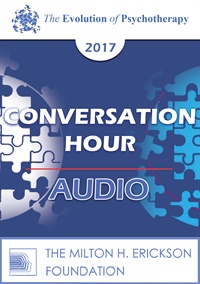
- Average Rating:
- Not yet rated
- Topic Areas:
- Conversation Hours | Psychoanalysis | Psychotherapy | Therapist Development
- Bundle(s):
- Learning Track - EP17 Psychoanalysis Download | EP17 Audio Streaming Build a Bundle
- Categories:
- Evolution of Psychotherapy | Evolution of Psychotherapy 2017 | Evolution of Psychotherapy Psychoanalysis Learning Track
- Faculty:
- Otto Kernberg, MD
- Course Levels:
- Master Degree or Higher in Health-Related Field
- Duration:
- 1:01:21
- Format:
- Audio Only
- Original Program Date:
- Dec 15, 2017
- Short Description:
- A conversation hour with Dr. Otto Kernberg, centered on reflections about therapists “therapeutic ambitions”. Educational Objectives: Discuss how to avoid patient induced limitations on over-restriction of therapists’ aims as well as overly ambitious goals. How do we assess what are realistic expectations? And what are the patient’s realistic contributions to this assessment?
- Price:
- $15.00 - Base Price
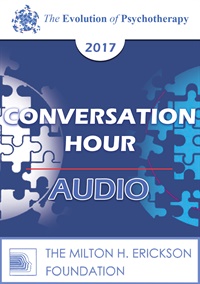
- Average Rating:
- Not yet rated
- Topic Areas:
- Conversation Hours | Psychotherapy | Therapist Development
- Bundle(s):
- Learning Track - EP17 CBT Download | EP17 Audio Streaming Build a Bundle
- Categories:
- Evolution of Psychotherapy | Evolution of Psychotherapy 2017
- Faculty:
- Donald Meichenbaum, PhD
- Course Levels:
- Master Degree or Higher in Health-Related Field
- Duration:
- 55:24
- Format:
- Audio Only
- Original Program Date:
- Dec 15, 2017
- Short Description:
- Research indicates the effectiveness of psychotherapeutic interventions, but some psychotherapists constantly achieve better treatment outcomes and lasting changes. What do these “expert” therapists do and not do to achieve these positive results?
- Price:
- $15.00 - Base Price
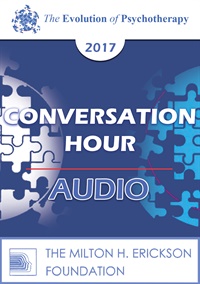
- Average Rating:
- Not yet rated
- Topic Areas:
- Conversation Hours | Strategic Therapy | Psychotherapy | Therapist Development
- Bundle(s):
- EP17 Audio Streaming Build a Bundle
- Categories:
- Evolution of Psychotherapy | Evolution of Psychotherapy 2017
- Faculty:
- Cloe Madanes, HDL, LIC
- Course Levels:
- Master Degree or Higher in Health-Related Field
- Duration:
- 1:01:58
- Format:
- Audio Only
- Original Program Date:
- Dec 15, 2017
- Short Description:
- To advance clinical goals, use client-based strategies. Most psychotherapy and coaching can be advanced through strategic applications.
- Price:
- $15.00 - Base Price

- Average Rating:
- Not yet rated
- Topic Areas:
- Conversation Hours | Virginia Satir | Psychotherapy | Therapist Development | Therapeutic Relationship
- Bundle(s):
- EP17 Audio Streaming Build a Bundle
- Categories:
- Evolution of Psychotherapy | Evolution of Psychotherapy 2017
- Faculty:
- Maria Gomori, MSW, PhD
- Course Levels:
- Master Degree or Higher in Health-Related Field
- Duration:
- 59:34
- Format:
- Audio Only
- Original Program Date:
- Dec 15, 2017
- Short Description:
- The Use of Self of the Therapist is the most important part of the therapeutic relationship.
- Price:
- $15.00 - Base Price
Please wait ...



